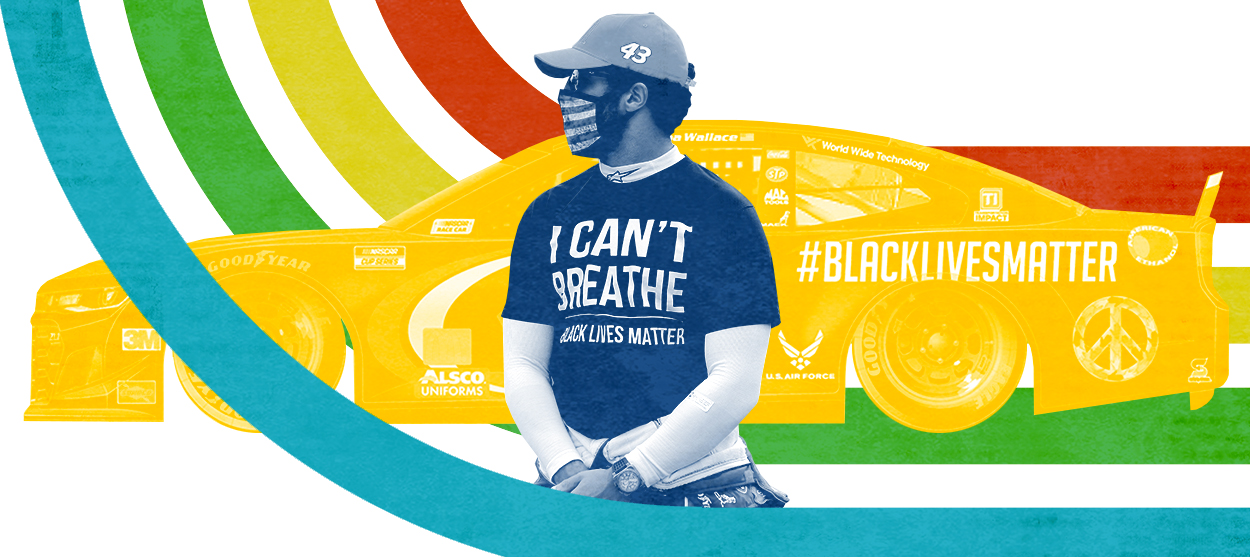NASCAR's surprising wokeness
The sport is embracing the Black Lives Matter movement. Is that really so shocking?


A free daily email with the biggest news stories of the day – and the best features from TheWeek.com
You are now subscribed
Your newsletter sign-up was successful
Lockdown boredom has not been enough to convince my wife to start watching NASCAR, which resumed on May 17. The millions of other Americans for whom this has also been true can be forgiven for not having watched a moving video that aired before last Sunday's race in Atlanta in which a group of drivers, including the seven-time Cup Series champion Jimmie Johnson, spoke out about the deaths of George Floyd and Breonna Taylor, much less having noticed a NASCAR technical inspector taking a knee with one fist raised in the air during the national anthem. Nor are they likely to have seen the new paint job on the African-American driver Bubba Wallace's number 43 Chevy: a hood emblazoned with two interlocked fists, one black and and one white, and, just behind the numerals, the words "Black Lives Matter."
If you need to take a minute to recover your jaw from the floor, I don't blame you. With no offense to the sport's millions of fans, to say nothing of team owners, drivers, and crew members, I think it is fair to say that in the broader public imagination, NASCAR is not exactly synonymous with wokeness and inclusion. (Only a few months ago, one racer, Kyle Larson, was indefinitely suspended after using a racial slur during a livestreamed event.) In a bizarre and indelibly American sense, that is what is so delightful about these recent actions: The league did not stand to gain very much in the way of public estimation here. This is even more true of another recent move taken in response to a suggestion by Wallace, who showed up to last Sunday's race in an "I Can't Breathe" t-shirt: the banning of Confederate flags at all races and other official events. The fact that this is even a live issue in a professional sport in 2020 says a lot.
NASCAR and its fanbase are overwhelmingly white, and I would be lying if I didn't say that on paper Wallace, the only black driver on its premier circuit, sounds like a character from an old Dave Chappelle routine. But the world is a complicated place. Stereotypes about rural America and working-class white people are not always true. Wallace's rise through the world of racing — after taking part in NASCAR's little-heralded Drive For Diversity Program — will be less surprising to fans of the sport, many of whom know that the African-American NASCAR Hall of Famer Wendell Scott was competing in 1953, two decades before the college football teams at Georgia and LSU would integrate.
The Week
Escape your echo chamber. Get the facts behind the news, plus analysis from multiple perspectives.

Sign up for The Week's Free Newsletters
From our morning news briefing to a weekly Good News Newsletter, get the best of The Week delivered directly to your inbox.
From our morning news briefing to a weekly Good News Newsletter, get the best of The Week delivered directly to your inbox.
Wallace himself is not only a talented driver (his 2018 second-place finish in the Daytona 500 was the best ever for a rookie); he is also a classic NASCAR personality, a world-class prick in the vein of Dale Earnhardt and Tony Stewart. Two years ago he was fined $50,000 after splashing water in the face of Alex Bowman, to whom he had given the finger multiple times during a race. Wallace shows us that people of all races can be rednecks.
This is something that hundreds of thousands of NASCAR fans already know, especially in the South. A similar point about shared cultural assumptions between African Americans and MAGA hat wearers was made in one of the only funny Saturday Night Live sketches of the last decade. I see this every day in the small conservative Michigan town where I live. Out here black and white Americans are united not only by our common humanity but by the not exactly astonishing fact that most of us live remarkably similar lives: raising our families, mowing our lawns, grumbling about bad water, worshipping God. A Black Lives Matter protest recently drew several hundred of us in a city of 7,500 on a weekday afternoon. The atmosphere was remarkably peaceful, comparable to the annual downtown water festival: Mothers complained about the price of ground beef, fathers speculated about the upcoming NFL season, neighbors chatted, teenagers waved signs and snapped selfies, children played, the cops we all cordially dislike stood there and listened. The most up-to-date campus radical-approved activism it may not have been, but it was authentic and serious and motivated by genuine love.
What Wallace and NASCAR are reminding the country is that we are not alone.
Want more essential commentary and analysis like this delivered straight to your inbox? Sign up for The Week's "Today's best articles" newsletter here.
A free daily email with the biggest news stories of the day – and the best features from TheWeek.com
Matthew Walther is a national correspondent at The Week. His work has also appeared in First Things, The Spectator of London, The Catholic Herald, National Review, and other publications. He is currently writing a biography of the Rev. Montague Summers. He is also a Robert Novak Journalism Fellow.
-
 6 of the world’s most accessible destinations
6 of the world’s most accessible destinationsThe Week Recommends Experience all of Berlin, Singapore and Sydney
-
 How the FCC’s ‘equal time’ rule works
How the FCC’s ‘equal time’ rule worksIn the Spotlight The law is at the heart of the Colbert-CBS conflict
-
 What is the endgame in the DHS shutdown?
What is the endgame in the DHS shutdown?Today’s Big Question Democrats want to rein in ICE’s immigration crackdown
